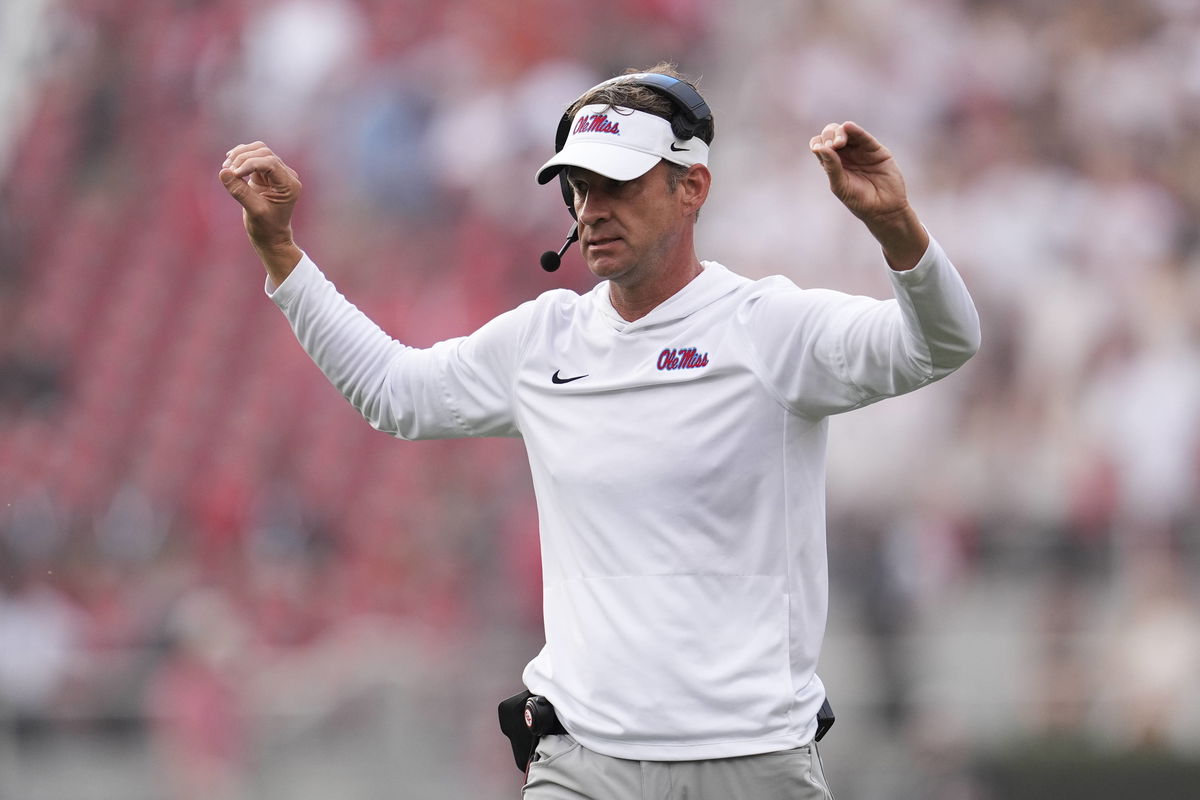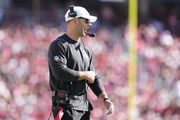
Imago
NCAA, College League, USA Football: Mississippi at Georgia Oct 18, 2025 Athens, Georgia, USA Mississippi Rebels head coach Lane Kiffin reacts during the second half of the game against the Georgia Bulldogs at Sanford Stadium. Athens Sanford Stadium Georgia USA, EDITORIAL USE ONLY PUBLICATIONxINxGERxSUIxAUTxONLY Copyright: xDalexZaninex 20251018_ajw_sz2_136

Imago
NCAA, College League, USA Football: Mississippi at Georgia Oct 18, 2025 Athens, Georgia, USA Mississippi Rebels head coach Lane Kiffin reacts during the second half of the game against the Georgia Bulldogs at Sanford Stadium. Athens Sanford Stadium Georgia USA, EDITORIAL USE ONLY PUBLICATIONxINxGERxSUIxAUTxONLY Copyright: xDalexZaninex 20251018_ajw_sz2_136
When the SEC announced its annual opponents for the next four seasons, most of the pairings made sense at first glance. Alabama-Auburn made sense; geography played its part, and everyone got their expected dance partners. But dig a little deeper into how Greg Sankey and his team actually constructed this schedule, and Oklahoma versus Ole Miss stands out as particularly revealing about where the conference thinks these programs are headed.
Watch What’s Trending Now!
Sankey’s been pretty open about the methodology, and it’s more sophisticated than you might think. “You know, like the Oklahoma-Texas games that are obvious, Tennessee and Vanderbilt in in-state rivals. We have the Iron Bowl, we go through that,” Sankey explained when discussing the scheduling process.
Then he went on to detail how they used predictive analysis, looking at projected win-loss records going forward. “We have that down on a four-year analysis, just right around eight or nine percent, which is less than one game win, loss, or tie on all the schedules,” Sankey said, referring to the competitive balance they achieved. That’s a massive improvement from the old divisional format, which had spreads of 24-27 in the win-loss column.
ADVERTISEMENT
“At some point, you have to make decisions. And part of that is balance, part of that is geography, and part of it is to make the schedule work,” Sankey noted. The SEC commissioner emphasized that this was about balancing all nine conference games across a four-year cycle. What makes the Oklahoma-Ole Miss pairing so intriguing is that it checks none of the traditional boxes. These schools have played exactly twice in their history, once in the 1999 Independence Bowl and once in 2024 when Ole Miss beat Oklahoma 26-14 in Oxford. They’re not geographic neighbors. Oxford and Norman sit about 560 miles apart. There’s no historical rivalry to preserve here.
Greg Sankey addresses the choice to pit the #Sooners against Ole Miss as annual opponents. https://t.co/O8gIXkp037 pic.twitter.com/XHETVu9GTQ
— Colton Sulley (@colton_sulley) November 1, 2025
So why pair them annually? The answer lies in those predictive models Sankey mentioned. Lane Kiffin has turned Ole Miss into a consistent 9-11 win program, posting records of 10-3, 8-5, 11-2, 10-3, and currently 8-1 this season.
ADVERTISEMENT
But the thing that makes this whole thing a gamble is that everything about Ole Miss’s projected trajectory hinges on $83 million coach Lane Kiffin staying in Oxford. And right now, that’s far from guaranteed. Lane Kiffin automatically earned a contract extension through 2031 after beating Oklahoma, but he’s refused to sign the new deal Ole Miss has offered him. With Florida and LSU both having coaching vacancies, ESPN’s Pete Thamel said flat-out, “It’s difficult to envision Lane Kiffin remaining at Ole Miss for the upcoming season. The possibilities at either LSU or Florida are simply too significant.”
If Kiffin leaves, does Ole Miss maintain that 9-10 win pace that made them attractive for this annual pairing? Or does the program slip back toward mediocrity, leaving the SEC with an unbalanced schedule for the next four years?
ADVERTISEMENT
Sankey’s rolling the dice that the infrastructure Lane Kiffin built will outlast him if he bolts. It’s the long-term bet conference commissioners get paid to make. But it’s also something that can blow up spectacularly if your projections don’t account for the human element. Time will tell if Sankey’s predictive models accounted for Kiffin’s wandering eye.
Lane Kiffin is disappointed
Lane Kiffin is known for being direct, and he certainly didn’t sugarcoat things when the SEC announced that Ole Miss would play Oklahoma annually starting in 2026. Back in late September, Kiffin made his feelings pretty clear about the pairing. “The Oklahoma (pairing) is really disappointing,” Lane Kiffin said bluntly. “We don’t have anything in common with them or our fans, so that doesn’t make any sense at all. And so that’s unfortunate with so many great teams that we played for a long time here, especially from our SEC West years. That’s unfortunate.” Kiffin genuinely seemed baffled by the decision, especially considering all the traditional SEC West opponents the Rebels had built history with over the years.
ADVERTISEMENT
What made Kiffin’s comments even more pointed was his breakdown of the logic, or lack thereof, behind Ole Miss’s three permanent opponents. “Obviously, the Egg Bowl (vs. Mississippi State) is staying, so they really had two choices. The LSU makes sense, and that’s great. The other one makes no sense.”
Some Oklahoma fans initially took Kiffin’s remarks as a slight, but really, it was more of a compliment to the Sooners’ consistency. Having Oklahoma on the schedule every year means facing a program that’s going to be competitive annually, unlike some other potential options that might’ve been easier wins.
Top Stories
Falcons Owner Arthur Blank Makes Double Firing Decision as Locker Room Stands Against Raheem Morris’ Exit

Cowboys Star Faces NFL Discipline For Jaxson Dart Incident Against Giants

49ers’ Deommodore Lenoir Goes on Expletive-Laced Rant Against Troy Aikman After Criticism From Cowboys Legend

Kirk Cousins Announces Return Stance With Falcons After Atlanta’s Four-Game Win Streak

Nine NFL Coaches Who Could Receive Black Friday Pink Slips: Predictions on Pete Carroll, Todd Bowles, Matt LaFleur & More

LSU’s Second Straight Loss Forces Kim Mulkey To Admit a Hard Truth

Still, Kiffin’s frustration boiled down to one simple point. There’s zero history between these programs, the geography doesn’t line up, and the SEC supposedly wanted to preserve rivalries. On all those fronts, the Oklahoma-Ole Miss pairing just didn’t add up in his mind.
ADVERTISEMENT
ADVERTISEMENT
ADVERTISEMENT
ADVERTISEMENT

